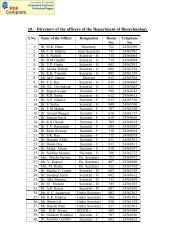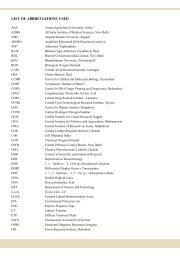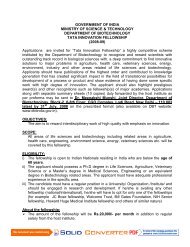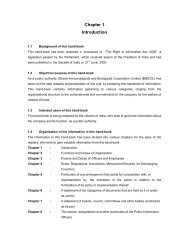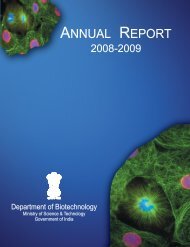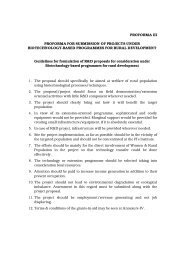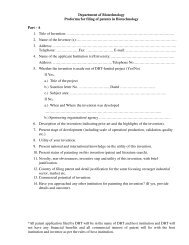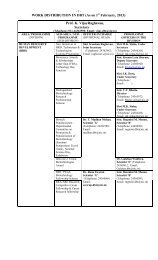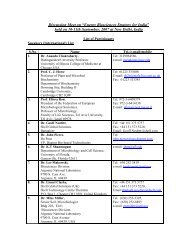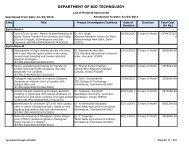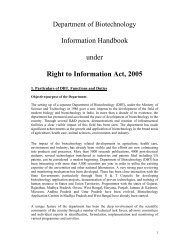ANNUAL REPORT - Department of Biotechnology
ANNUAL REPORT - Department of Biotechnology
ANNUAL REPORT - Department of Biotechnology
You also want an ePaper? Increase the reach of your titles
YUMPU automatically turns print PDFs into web optimized ePapers that Google loves.
(RBSS) assay.<br />
Study was supported at IISc, Bangalore on functional<br />
analysis <strong>of</strong> meiosis in Arabidopsis using candidate<br />
gene approach. So far generation <strong>of</strong> AML RNAi<br />
constructs has been completed. The corresponding<br />
portion <strong>of</strong> the OML5 gene has been PCR amplified,<br />
cloned, and authenticated. A 3.6 kb region <strong>of</strong> the<br />
AML3 has been amplified and construction <strong>of</strong> the<br />
pAML2::GUS fusion in the reporter gene vector<br />
pBI101 has been completed. Transformation <strong>of</strong><br />
Arabidopsis with AML RNAi construct has been done<br />
and multiple T1 transgenic plants have been<br />
obtained. Detailed characterization <strong>of</strong> phenotypes in<br />
70 T1 plants screened has been completed. In 11 out<br />
<strong>of</strong> 70 T1 plants sterility was observed due to defects<br />
in male and female gametogenesis.<br />
Host Pathogen Interaction<br />
Studies have been supported during the year on<br />
Host Pathogen Interaction concentrating on the<br />
following areas :- Molecular basis <strong>of</strong> determinants <strong>of</strong><br />
host-pathogen specificity; Functional<br />
characterization <strong>of</strong> R/ Avr genes, Early events in<br />
pathogenesis initiation with respect to adhesion,<br />
penetration mechanisms, hydrolytic enzymes etc.,<br />
Study <strong>of</strong> signal transduction cascade involved in<br />
early events both in host as well as pathogen, Gene<br />
expression pr<strong>of</strong>iling <strong>of</strong> plant(s) and pathogen(s)<br />
during pathogenesis, Innate immunity / non-host<br />
resistance; Systemic Acquired Resistance; Induced<br />
Systemic Resistance etc., Mechanism <strong>of</strong><br />
Pathogenicity, Genetic diversity <strong>of</strong> important plant<br />
pathogens., Genome sequencing and functional<br />
genomics <strong>of</strong> important pathogens. These studies<br />
have been supported to understand and develop the<br />
complex interactions between plant pathogen and<br />
host plants.<br />
SOL Genome<br />
An international consortium <strong>of</strong> ten countries,<br />
including USA, Korea, China, UK, India,<br />
Netherlands, France, Japan, Spain and Italy aims at<br />
sequencing the euchromatic region <strong>of</strong> the tomatog<br />
genome under the auspices <strong>of</strong> “The International<br />
DBT Annual Report 2006-07<br />
78<br />
Tomato Sequencing Project”. India which is one <strong>of</strong><br />
the partner has been assigned ~12 Mb euchromatic<br />
region <strong>of</strong> chromosome 5 for sequencing. The Indian<br />
initiative on tomato genome sequencing is being<br />
taken up by 3 centres with UDSC and NCPGR<br />
sequencing the short arm, and NRCPB sequencing<br />
the long arm. In all, 38 BAC clones, covering<br />
approximately 3.8 Mb regions have been mapped to<br />
chromosome 5.<br />
Status Clones selected Marker cM<br />
Phase I SL_MboI0050C14<br />
Phase III LE_HBa0191B01 CT101<br />
0<br />
Phase II LE_HBa0106O06 C2-At1g60440 0<br />
Phase II LE_HBa0051A13 T1252<br />
3<br />
Phase II SL_MboI0005B15<br />
Phase III LE_HBa0261K11 C2-At1g60200 7<br />
Phase I SL_EcoRI0086I08<br />
Phase III LE_HBa0042B19 cLET-8-B23 10<br />
Phase I LE_HBa0189E17 T0564 11<br />
Phase II LE_HBa0179E24 cLED-8-G3 15.5<br />
Phase III SL_MboI0037H06<br />
Phase I SL_MboI0095J08<br />
Phase II LE_HBa0074A13<br />
Phase III LE_HBa0058L13 T1592<br />
16<br />
Phase II LE_HBa0195M17<br />
Library LE_HBa0165L04 TG432 21<br />
Phase II<br />
Phase II<br />
Phase III<br />
LE_HBa0051A18<br />
LE_HBa0027B05<br />
SL_EcoRI0053P22<br />
BS4<br />
22<br />
Library SL_EcoRI0073I01<br />
Phase I LE_HBa0169M21 T1360 73<br />
Phase I<br />
Library<br />
LE_HBa0334K22<br />
LE_HBa0138J03<br />
cLEX-13-G5<br />
T1746<br />
79<br />
84<br />
Phase II LE_HBa0166A02 T1777 105<br />
Phase II<br />
Library<br />
Phase II<br />
Library<br />
Phase II<br />
Phase II<br />
Library<br />
Library<br />
Phase II<br />
Library<br />
Phase II<br />
Library<br />
Phase II<br />
Library<br />
LE_HBa0040C21<br />
LE_HBa0025A19<br />
LE_HBa0131D04<br />
LE_HBa0100I06<br />
LE_HBa0006N20<br />
LE_HBa0108A18<br />
LE_HBa0019C24<br />
LE_HBa0141A12<br />
LE_HBa0239D11<br />
LE_HBa0013H09<br />
LE_HBa0251J13<br />
LE_HBa0028M20<br />
LE_HBa0245E05<br />
LE_HBa0076P16<br />
T1584<br />
TG69<br />
CT130<br />
TG185<br />
TG597<br />
CT138<br />
108<br />
111<br />
115<br />
119<br />
119<br />
119<br />
Telomeric Region<br />
Euchromatic Region<br />
Heterochromatic Region<br />
Centromeric Region<br />
Heterochromatic Region<br />
Euchromatic Region<br />
Telomeric Region<br />
Sequencing status <strong>of</strong> tomato chromosome 5<br />
Annotation <strong>of</strong> fifteen BAC clones using FGENESH<br />
revealed a gene density <strong>of</strong> one gene per ~5 kb<br />
sequence. Some locus specific variations in gene<br />
density were also observed.<br />
Studies have also been supported to understand the<br />
molecular basis <strong>of</strong> root development in tomato. Root<br />
specific subtractive library from tomato using<br />
Suppression Subtraction Hybridization (SSH,<br />
Clontech) has been construccted. 34 root specific<br />
EST's have been generated. Another 500 clones are<br />
in the process <strong>of</strong> sequencing. Subtractive library for<br />
temporal specific genes (8-day root and 40-day root)<br />
have also been constructed and are further being<br />
screened.<br />
TILLING (Targeting induced local lesions in genome)<br />
is an advanced selective molecular breeding<br />
technology that allows improvement <strong>of</strong> crop plants for<br />
which the genome sequences are known or in<br />
progress. At University <strong>of</strong> Hyderabad, a study has<br />
been initiated where TILLING technology is being<br />
Short Arm<br />
Long Arm<br />
UDSC<br />
&<br />
NCPGR<br />
NRCPB



